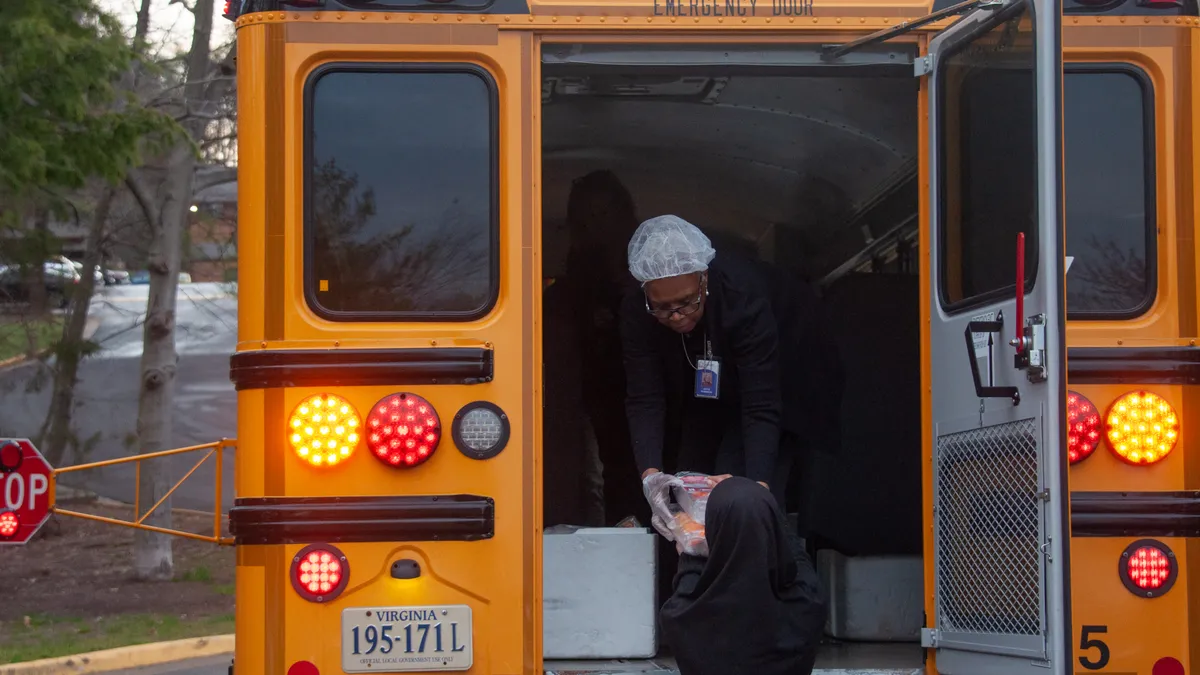When Utah Gov. Gary Herbert put all K-12 public schools under a soft close earlier this month to help mitigate the spread of novel coronavirus, the Duchesne County School District saw two potential problems: How would students have access to free breakfast and lunch? And what would happen to school support staff who depend on the income?
While some districts have kept schools open for children to come get meals during the school day, that raised transportation concerns in Duchesne’s rural, 5,300-student district spanning about 70 miles.
“So, we decided that the best thing we could do would be to get those meals out to the kids, and to keep our bus drivers working, we could have them deliver the meals to their normal bus stops,” said Scott Forsyth, the district's student services director.
Kitchen staff and teachers’ aides get to keep their jobs, too. Each morning, the employees work together to prepare meals and load them up on the buses to deliver. And at each bus stop, the children get to see familiar faces when the bus drivers and aides give them their food.
“They’re excited to see me, and they wave and they miss me,” said Cindy Labrum, a Duchesne bus driver of seven years. “They know when their bus driver comes that that’s a safe place for them.”
Driving a creative
As bus drivers in some school districts have been laid off or wait in limbo to see whether they’ll be paid for the duration of the shutdowns, Duchesne is one of many districts that has found a creative way to keep bus drivers employed.
Rick Middleton, Teamsters Western Region vice president and director of transportation, said school districts have been very cooperative. In California, where he also serves as secretary treasurer for the Teamsters local union, districts are also using bus drivers to shuttle meals and clean the buses. Similar stories are happening nationwide.
While pockets of small school districts haven’t been able to pay their bus drivers, he said, for those who aren’t getting paid, Teamsters is working with legislators in Congress to rectify that, he said.
The National School Transportation Association, which represents school bus contractors, manufacturers and suppliers, has asked Congress to fully fund school transportation contracts "through the conclusion of the COVID-19 health crisis," according to a press release.
For the 700 bus drivers in the Buffalo Public Schools in New York, the outlook is uncertain and drivers are already collecting unemployment. Last week, though, the district brought back those who usually drive buses for special education students to help distribute learning packets to students.
While parents of the system's some 34,000 students were asked to pick the materials up at schools, there were still more than 8,000 packets remaining. About 150 drivers spent most of last Wednesday sorting the packets by ZIP code and then by street, and on Thursday, about 200 drivers were dispatched to deliver the materials.
"Those drivers are the ones that pulled this whole thing off," said Rob Hummel, senior location manager for the district, which contracts with First Student for transportation services. Because the drivers worked two days, they weren't at risk of losing unemployment pay, he adds, noting if the closure lasts longer than expected, another delivery will be likely. While families are picking up food at distribution sites, it's possible drivers will also be involved in delivering meals.
"It's a very fluid situation, and changing on a weekly basis," Hummel said.
Health and safety
Bus drivers are concerned — not just about job security, but about their own health, said Ron Young, general manager for Durham School Services, the bus contractor for Roanoke City Public Schools in Virginia.
The first case of COVID-19 in that area was confirmed Thursday. One driver told him her adult children were pleading with her to stop working.
The district’s 151 drivers and aides are shuttling meals and learning packets across Roanoke instead of students. Traveling to bus stops and homes of students with special needs, the drivers deliver lunch and breakfast for the following day.
Last week, the drivers delivered over 49,000 meals for 25,000 people. Teachers and assistants are preparing the instructional materials and making sure they get on the right buses.
“It’s been a big change,” Young said. “Normally the drivers have a split day. Now they’re driving the gap they don’t normally drive.”
Plus, meetings that normally include the whole crew have been split into four to enforce social distancing.
In York County, Virginia, bus driver James Allen, who is on paid leave through March 27 — at which time he’s not sure what will happen — said he’s concerned about the students and has been thinking especially of high school seniors who were looking forward to things like prom and graduation.
“I think when they initially canceled school, they were hoping that this thing would be over in two to three weeks, but it’s looking like it’s going to last longer than that,” he said.
As for Duchesne, the uncertain times have made the tight-knit community even closer.
“We receive emails and text messages from a lot of our parents who are expressing thanks and gratitude at this difficult time,” Labrum said. “Being in a small rural community, there’s always things that whenever there’s a crisis or something difficult — even an unexpected death — our communities band together and we help each other.”
Linda Jacobson contributed to reporting in this article.

















